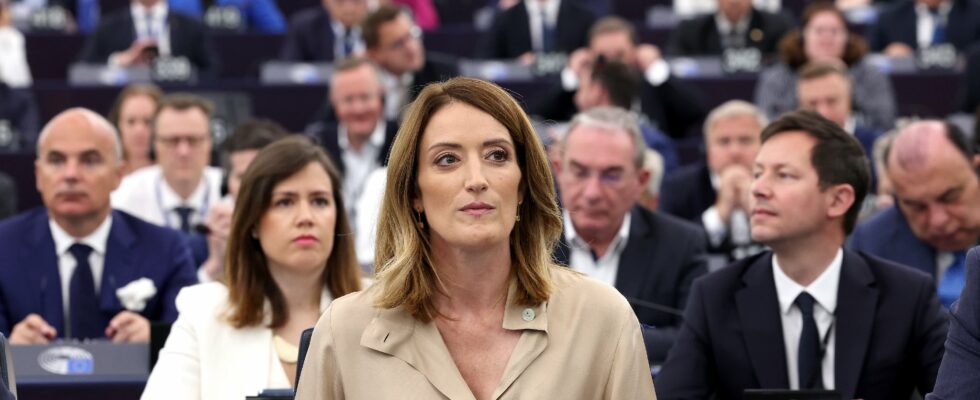She won 562 votes, while her only opponent won only 61. A clear plebiscite for the Maltese conservative Roberta Metsola, 45, re-elected on Tuesday 16 July as President of the European Parliament by an overwhelming majority of MEPs. The vote took place at the opening of their first plenary session in Strasbourg following the June elections.
Coming from the EPP (right), the largest political force in Parliament, Ms Metsola was re-elected for a new term of two and a half years by 562 votes, against 61 votes for the Spaniard Irene Montero (radical left).
“We need a strong Parliament in a strong Union (…) to maintain the pressure to guarantee our right of initiative (in the face of the European Commission), improve our powers of control and investigation, and remedy institutional imbalances,” insisted Ms Metsola.
She called for “giving people back enthusiasm and belief in the European project, a safer, more equal shared space”, in particular by strengthening “the social pillar” of the EU and briefly welcomed in French the location of the institution’s headquarters in Strasbourg, “a living symbol of reconciliation” within Europe. “Europe remains the answer. Long live Europe!”, she concluded.
Very active support for Ukraine
Roberta Metsola was first elected President of the European Parliament in January 2022. Brought to this position by an agreement between the EPP, the Socialists (S&D) and the Liberals (Renew), she was then the youngest to take the helm of the assembly, the only elected institution of the EU. She is the third woman to accede to this function, after the French Simone Veil (1979-1982) and Nicole Fontaine (1999-2002).
Roberta Metsola has distinguished herself by her very active support for Ukraine: she was the first head of an EU institution to visit Kiev in early April 2022, just over a month after the start of the Russian offensive.
Under his leadership, the European Parliament voted, at the end of lengthy negotiations, on the environmental legislation of the Green Deal, unprecedented regulations imposed on digital giants and the texts of the EU Migration Pact.
Roberta Metsola was also under pressure after the resounding Qatargate scandal surrounding suspicions of corruption of elected officials involving Qatar and Morocco, which broke out in December 2022. Greek socialist MEP Eva Kaili, then one of her 14 vice-presidents, was arrested and removed from office. Keen to restore the credibility of a contested institution, Roberta Metsola had promised “far-reaching reforms”, via better controls and transparency registers, while warning that this was only “a beginning”.
Opposed to abortion
Her career is inseparable from the history of her island: while still a student, she joined the Nationalist Party of Malta (Christian Democrats) and campaigned for her country’s accession to the EU in 2003. A doctor of law and trained at the College of Europe in Bruges, a hotbed of European elites, she worked for the permanent representation of Malta to the EU and then for the head of EU diplomacy, before becoming an MEP in 2013 on her third attempt.
Opposed to abortion, Ms. Metsola had voted in 2021 against resolutions condemning the ban on abortion in Poland and Texas. But she had committed when she became president to defend the official positions of the institution and to “go further to guarantee and defend women’s rights” and to counter violence against women – priorities that she reiterated again on Tuesday.
His election in 2022 followed the tradition of alternating between the left and the right as president in mid-term elections in parliament. His predecessor was the Italian social democrat David Sassoli, who died shortly before the end of his term in January 2022.
